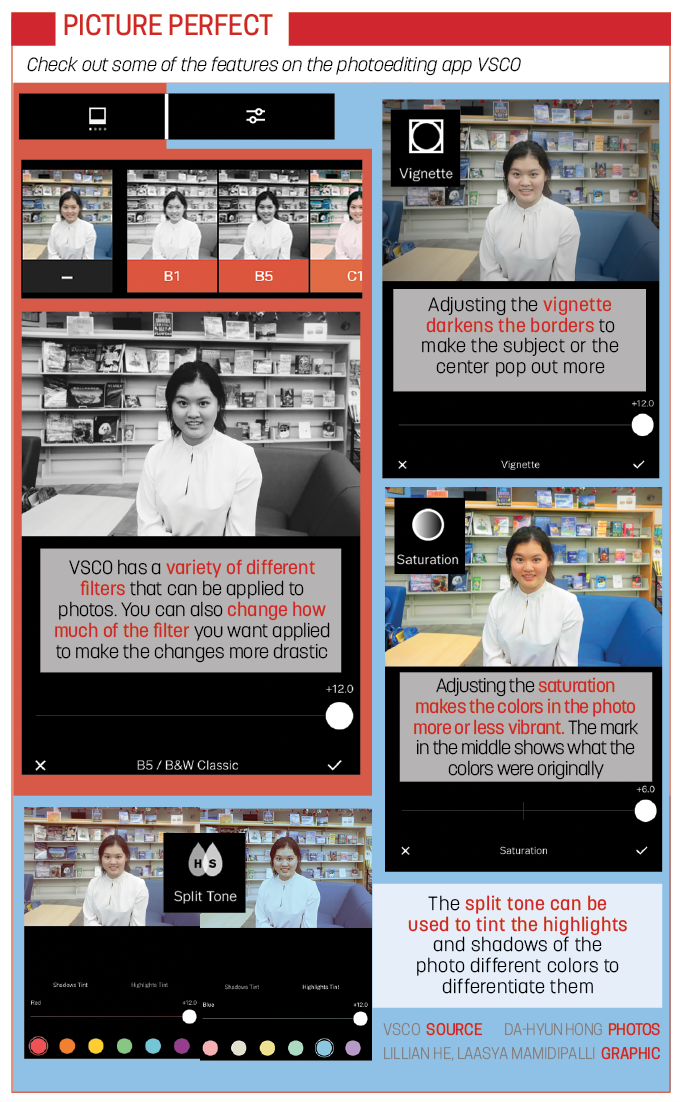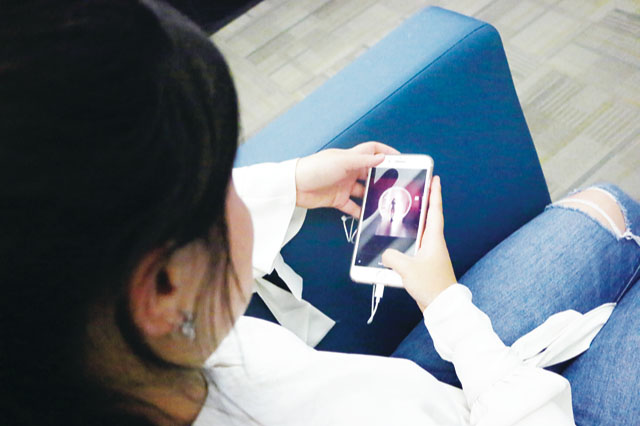As apps like Facetune have shot up in popularity over the course of the past few years, photo editing has become easier than ever. With a single tap or click, users are quickly able to erase any blemishes or imperfections they may have, allowing them to create their ideal photo or selfie. According to Lightricks, the developer of Facetune and Facetune 2, the photo editing app topped App Store charts in the photo and video category in over 100 countries and also became one of the top paid apps in the store.
However, with the rise of such applications, there is also the question of how they can affect self-esteem and confidence, especially in young, impressionable teenagers. For senior Kelly Xiang, photo editing has not necessarily become a harmful issue, but it does play a role in the images she shares on social media platforms like Instagram.
 “For editing, I’ve used VSCO, and I’ve also used BeautyPlus, which is what makes you a little bit taller and can fix small blemishes,” Xiang said. “Sometimes if I really like a photo but I don’t really like the way my body looks, like if I think my legs are too short, I’ll elongate them, but when it comes to body modifications, I try not to do too much of it.”
“For editing, I’ve used VSCO, and I’ve also used BeautyPlus, which is what makes you a little bit taller and can fix small blemishes,” Xiang said. “Sometimes if I really like a photo but I don’t really like the way my body looks, like if I think my legs are too short, I’ll elongate them, but when it comes to body modifications, I try not to do too much of it.”
When editing photos, Xiang said she keeps in mind that others know how she looks in real life so she does not edit too excessively.
Critics of apps like Facetune often claim that photo editing harms self-image and causes people to strive for the unattainable, but public figures such as James Charles claim that Facetune does not promote a pursuit of perfection, but simply a better photo. Xiang said that with photo editing, there are both advantages and drawbacks.
“With photo editing, you get the photo you want, and I feel like creating that photo is fun in a way; it’s like creating a work of art when you’re happy with the result,” Xiang said. “But I definitely think (photo editing) can drop your confidence or self-esteem because when I edit my photos, there’s always this thing that shows me the before and after, so seeing that sometimes makes you see the giant difference in the photos. If you fall too deep into (photo editing), that could lead to body dysmorphia where you might think your nose is too big because you keep editing it smaller, or you think you’re too fat because you keep editing yourself to be thinner. It’s good to make minor changes if you think it’ll make the photo better, but it shouldn’t get to the point where you think the simplest photos need editing.”
Sophomore Kalika Raje also said photo editing can be a double-edged sword with both pros and cons, even though she just established her presence on social media this year.
“I think in some cases, photo editing can kind of be used as an art and be used to build a certain aesthetic, but I think one of the biggest downsides of it is that it can help perpetuate unrealistic standards and can fuel people’s insecurities,” Raje said. “There are so many people that keep up with influencers, and I’m sure there’s this comparison thing that goes on when you see these unrealistic or edited photos of them, and comparison breeds misery, so I do think it really takes someone who looks at social media in a more positive light in order to not have that comparison factor.”
Kevin Daly, art and photography teacher, said he agrees that students can be negatively affected by photo editing but also said that it has become so commonplace in modern day society that it should not come as a surprise to most people.
“We’re sort of trying to achieve this image that very few people have naturally, so I do think that would mess with teenagers’ self-image,” Daly said. “(However), I think it’s also important to remember that even professional photos done by magazines are constructions as well, so nobody really looks as perfect as the photo makes them seem.”
In general, however, Xiang said people who do edit photos should not be scrutinized for what they do, as most cases of photo editing are not extreme and are only meant for minor touch-ups.
“If you have an acne spot, you’re going to fix it; if there’s a glare in your eye, you’re going to fix it,” Xiang said. “I think it’s more about fixing the little imperfections. With little imperfections like pimples and blemishes, I feel like you’d either fix it in real life with something like makeup or just fix it on the digital sphere. I don’t think people should judge others because they Photoshop, but you should also sort of set some limits on the extent to which you edit because you don’t want to present this false image of yourself.”

































![AI in films like "The Brutalist" is convenient, but shouldn’t take priority [opinion]](https://hilite.org/wp-content/uploads/2025/02/catherine-cover-1200x471.jpg)










































![Review: “The Immortal Soul Salvage Yard:” A criminally underrated poetry collection [MUSE]](https://hilite.org/wp-content/uploads/2025/03/71cju6TvqmL._AC_UF10001000_QL80_.jpg)
![Review: "Dog Man" is Unapologetically Chaotic [MUSE]](https://hilite.org/wp-content/uploads/2025/03/dogman-1200x700.jpg)
![Review: "Ne Zha 2": The WeChat family reunion I didn’t know I needed [MUSE]](https://hilite.org/wp-content/uploads/2025/03/unnamed-4.png)
![Review in Print: Maripaz Villar brings a delightfully unique style to the world of WEBTOON [MUSE]](https://hilite.org/wp-content/uploads/2023/12/maripazcover-1200x960.jpg)
![Review: “The Sword of Kaigen” is a masterpiece [MUSE]](https://hilite.org/wp-content/uploads/2023/11/Screenshot-2023-11-26-201051.png)
![Review: Gateron Oil Kings, great linear switches, okay price [MUSE]](https://hilite.org/wp-content/uploads/2023/11/Screenshot-2023-11-26-200553.png)
![Review: “A Haunting in Venice” is a significant improvement from other Agatha Christie adaptations [MUSE]](https://hilite.org/wp-content/uploads/2023/11/e7ee2938a6d422669771bce6d8088521.jpg)
![Review: A Thanksgiving story from elementary school, still just as interesting [MUSE]](https://hilite.org/wp-content/uploads/2023/11/Screenshot-2023-11-26-195514-987x1200.png)
![Review: "When I Fly Towards You", cute, uplifting youth drama [MUSE]](https://hilite.org/wp-content/uploads/2023/09/When-I-Fly-Towards-You-Chinese-drama.png)
![Postcards from Muse: Hawaii Travel Diary [MUSE]](https://hilite.org/wp-content/uploads/2023/09/My-project-1-1200x1200.jpg)
![Review: "Ladybug & Cat Noir: The Movie," departure from original show [MUSE]](https://hilite.org/wp-content/uploads/2023/09/Ladybug__Cat_Noir_-_The_Movie_poster.jpg)
![Review in Print: "Hidden Love" is the cute, uplifting drama everyone needs [MUSE]](https://hilite.org/wp-content/uploads/2023/09/hiddenlovecover-e1693597208225-1030x1200.png)
![Review in Print: "Heartstopper" is the heartwarming queer romance we all need [MUSE]](https://hilite.org/wp-content/uploads/2023/08/museheartstoppercover-1200x654.png)




